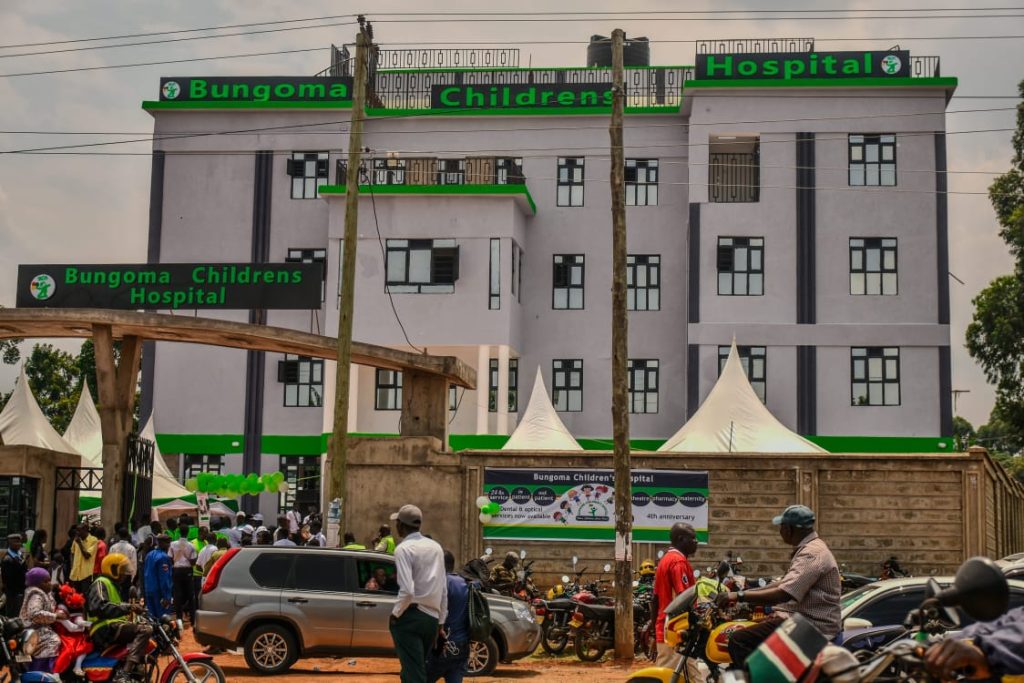By Tony Wafula
Bungoma Children’s Hospital has expanded its facilities in a bid to strengthen care for babies battling chronic diseases in the region. Some of the most common chronic diseases affecting children include asthma, diabetes (most children are affected by Type 1), congenital heart problems, cerebral palsy, multiple sclerosis (MS), cystic fibrosis, spina bifida, hydrocephalus, childhood cancer, and sickle cell disease.
Speaking to the press during the launch of the new storey building to accommodate the facility, Dr Dickens Lubanga, a paediatrician at Bungoma County Referral Hospital (BCRH), said that initially the facility provided inpatient services with a bed capacity of 10.
He added that the new building would increase the capacity to 80 beds, with 10 private wards and four semi-private wards. “We have also set up a small centre on top of the building that will provide play therapy for children, because we believe a healthy child should be able to play,” he said.

Dr Lubanga noted that many children in the region miss school because of chronic illnesses. “Chronic diseases like sickle cell are rampant in Bungoma and that is why we have decided to expand the facility so that we can help control the menace,” he said, adding that the community needs children who will later take up responsibilities from the current generation.
To address the growing number of sickle cell cases in the region, Dr Lubanga reported that Bungoma Children’s Hospital has established specialised clinics for the disease. He confirmed that the hospital is now equipped to conduct sickle cell screenings, unlike before when samples had to be sent to Eldoret for testing.
He emphasised the importance of premarital sickle cell screening as a key strategy in reducing the prevalence of the disease. “Sickle cell is a genetic disorder that is entirely preventable if couples get tested before marriage. This allows people to make informed decisions about their reproductive health,” he said.
Dr Lubanga pointed out the long-term challenges of raising a child with sickle cell disease. “Caring for a child with sickle cell from birth to adulthood is not only demanding but also financially draining. They require constant medication and frequent hospital visits,” he explained.
He noted that the disease can affect nearly every part of the body, adding that intensified screening can help families avoid such struggles by choosing compatible partners. “We want our children to live long and healthy lives, not to die prematurely from a disease we understand and can control. That’s why we urge couples to seek early counselling and testing before starting a family,” he said. He revealed that the hospital is currently managing a large number of patients with sickle cell disease.
He added that managing sickle cell disease can cost between Sh6,000 and Sh10,000 per month to cover treatment, Hydroxyurea, and vaccinations. Dr. Lubanga further stated that to enhance service delivery, the facility has collaborated with other hospitals in Eldoret and partners to procure advanced diagnostic equipment, adding that more specialists will be dispatched to the facility.
“We have spacious wards designed with children’s comfort in mind, complete play areas and family-friendly spaces,” he said.
Dr Lubanga lamented the shortage of health specialists, noting that Bungoma has only five paediatricians serving a population of more than two million people. “We now have enough consultation rooms here so that we don’t have to refer our patients to Eldoret, as has been the norm,” he added.





